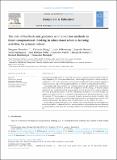The role of feedback and guidance as intervention methods to foster computational thinking in educational robotics learning activities for primary school.

Auteur, co-auteurs
Type de référence
Date
2022-04Langue de la référence
AnglaisEntité(s) de recherche
Résumé
Computational thinking (CT) is considered an emerging competence domain linked to 21st-century competences, and educational robotics (ER) is increasingly recognised as a tool to develop CT competences. This is why researchers recommend developing intervention methods adapted to classroom practice and providing explicit guidelines to teachers on integrating ER activities. The present study thus addresses this challenge. Guidance and feedback were considered as critical intervention methods to foster CT competences in ER settings. A between-subjects experiment was conducted with 66 students aged 8 to 9 in the context of a remote collaborative robot programming mission, with four experimental conditions. A two-step strategy was employed to report students' CT competence (their performance and learning process). Firstly, the students' CT learning gains were measured through a pre-post-test design. Secondly, video analysis was used to identify the creative computational problem-solving patterns involved in the experimental condition that had the most favourable impact on the students’ CT scores. Results show that delayed feedback is an effective intervention method for CT development in ER activities. Subject to delayed feedback, students are better at formulating the robot behaviour to be programmed, and, thus, such a strategy reinforces the anticipation process underlying the CT.Titre du périodique
Computers and EducationMaison d’édition
ElsevierPays d'édition
Royaume-Unip-ISSN
0360-1315e-ISSN
1873-782XEvaluation par les pairs (peer reviewing)
ouiVolume / tome
180Pagination
104431URL permanente ORFEE
http://hdl.handle.net/20.500.12162/5454Autre(s) URL(s) permanente(s)
http://doi.org/10.1016/j.compedu.2022.104431https://www.sciencedirect.com/science/article/pii/S0360131522000021
La publication existe uniquement sous forme électronique
ouiDocument(s) associé(s) à la référence
Texte intégral :
Fichier
Accès
Commentaire
Version
Taille
- Tout ORFEE
- Détail référence



